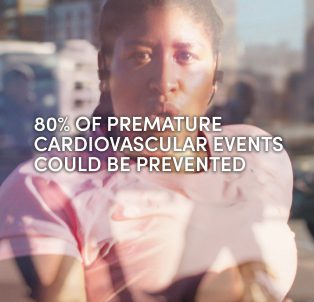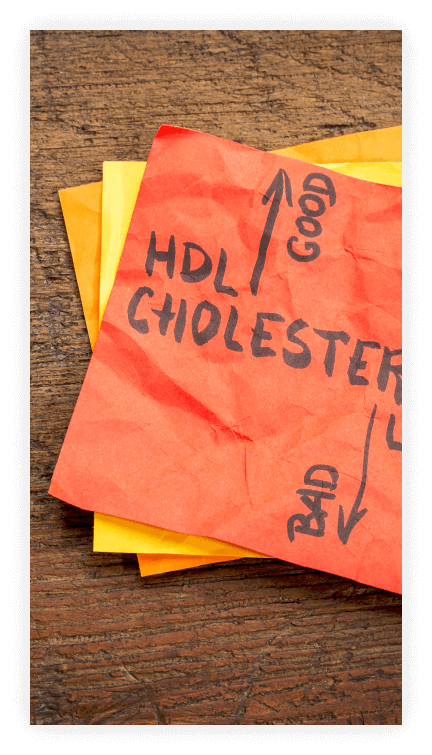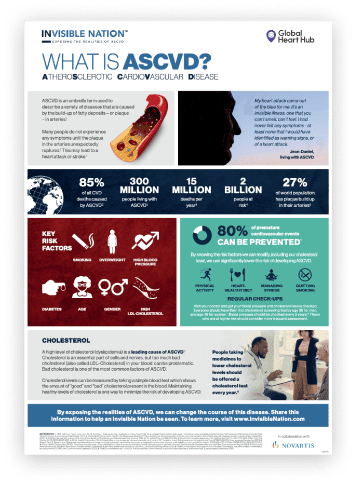ASCVD
Home / ASCVD
ASCVD – Atherosclerotic Cardiovascular Disease





What Is ASCVD?
ATHEROSCLEROTIC CARDIOVASCULAR DISEASE, ASCVD
Given how widespread and devastating this chronic disease can be, it is important to identify who is vulnerable. Key causes of ASCVD include:
- high levels of cholesterol (dyslipidemia)
- high blood pressure (hypertension)
- smoking
- diabetes
- family history
- certain genetic pre-conditions, such as inherited high cholesterol that starts at a young age, such as FH (familial hypercholesterolemia)
Croí is a member of FH Europe. See here for more information on FH. Link here - Other risk factors that contribute to ASCVD include a poor diet, low levels of physical activity, being overweight, excessive alcohol intake, and stress. Age and gender are also contributory factors, especially in women after menopause.
Some of the causes that lead to ASCVD are outside of our control. However, there are several risk factors that we can take control of. By focusing on these, we can significantly reduce the risk of developing ASCVD.
- Physical activity. Aim to move more and reduce your sitting time. Small changes such as taking the stairs instead of the lift can make a big difference to your health. Being active is a great way to strengthen your heart muscle, manage your cholesterol, weight and blood pressure and most importantly makes you feel good.
- Heart-healthy diet. Limiting our intake of saturated fat, alcohol, sugar and salt can help reduce our cholesterol, blood pressure, weight and risk of diabetes.
- Managing stress. Being stressed or anxious may bring on symptoms like angina or chest pain but developing ways to cope with stress can reduce its effect on your health.
- Quitting smoking. Smoking doubles your risk of developing heart disease. If you are a smoker, the single most important thing you can do is to stop smoking!
- Regular check– Visit your doctor and get your blood pressure and cholesterol levels checked. Everyone should have their first cholesterol screening test by age 35 for men, and age 45 for women. Blood pressure should be checked at least every 2 years. Those who are at higher risk should consider more frequent assessment: those taking medicines to lower cholesterol levels should be offered a cholesterol test every year.
- Maintaining healthy levels of cholesterol and triglycerides is important for our health. Like blood pressure, a high cholesterol level does not generally cause any symptoms. Your cholesterol level can be measured by taking a simple blood test, which will usually report your overall cholesterol level (total cholesterol); your HDL (good cholesterol); LDL (bad cholesterol); non-HDL-C (bad cholesterol) and triglycerides. It is recommended that adults have their cholesterol checked regularly if they have a cardiac history or are already on cholesterol lowering treatment.
- It is important to acknowledge that some people are not able to achieve the recommended levels of cholesterol through lifestyle changes alone and will require medication if their levels of LDL-cholesterol are too high. Medication is not a substitute but an add-on to exercise, relaxation, and balanced nutrition. There are different types of treatments that can be prescribed by your doctor to reduce LDL-cholesterol. It is important that your doctor evaluates which is the right medication for you. The adoption of positive lifestyle changes and use of appropriate medical therapies slow down the progression of ASCVD. This will help lower the risk of cardiac events such as strokes and heart attacks.


“Good cholesterol” or high-density lipoprotein cholesterol (HDL-Cholesterol) helps remove bad cholesterol from your arteries. A high level of HDL-cholesterol protects against heart disease.
“Bad cholesterol” or low-density lipoprotein cholesterol (LDL-cholesterol) contributes to the build-up of fat deposits in your arteries (atherosclerosis). Over time this build-up leads to a hardening and narrowing of your arteries which can lead to a heart attack or stroke.
Too much bad cholesterol (LDL-cholesterol) is a major driver of ASCVD.
In addition to ‘Good’ and ‘Bad’ Cholesterol there are two other fatty elements which are linked to ASCVD
- Triglycerides which are fats that circulate in the blood stream with Cholesterol. High levels of triglycerides are known to increase your risk of ASCVD.
- Lipoprotein(a) which is structurally very similar to LDL-cholesterol. Lipoprotein(a) can contribute to plaque buildup and high levels of lipoprotein(a) are mainly due to hereditary reasons. It is recommended that this should be measured at least once in a person’s lifetime.
- Non–high density lipoprotein cholesterol (non-HDL-C) is another measure of your bad cholesterol and is useful for assessing ASCVD risk in those with high triglyceride levels, diabetes, obesity or very low LDL levels.
Add your name to endorse the Global Cholesterol Action Plan here
Watch Back:
Cholesterol – What Is It and What Does It Have to Do With Me?
This FREE webinar, which was supported by Novartis, took place online via Zoom on, Thursday, June 1st 2023, from 6-7 pm.
Expert speakers included: JP Corry shared his patient perspective of early on-set heart disease, Dr. Susan Connolly, Consultant Cardiologist, Integrated Care, University Hospital Galway and CHO2 West and Dr. Patricia O’Connor, Consultant Physician in Clinical Pharmacology and Internal Medicine, St James Hospital. Dr Jenni Jones, Director of Training & Education at the NIPC, moderated the session.
This FREE webinar took place online via Zoom on Thursday, November 24th, from 7 – 8 pm.
Expert speakers included:
- Neil Johnson, Chief Executive of Croí, hosted the webinar and facilitated our interactive panel discussion
- Dr Susan Connolly, Consultant Cardiologist, Integrated Care, University Hospital Galway and CHO2 West
- Roseann Butler, shared her patient perspective on living with FH
- Emma Broome, diagnosed with FH & LP(a). Listen to the impact of unmanaged high cholesterol on your heart health
